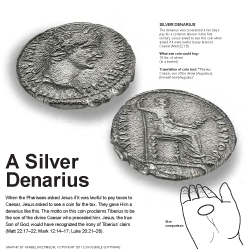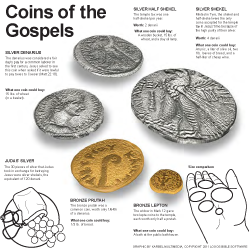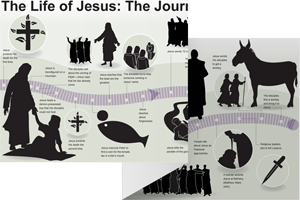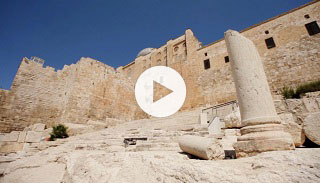20:1–16 Bracketed by role-reversal statements in 19:30 and 20:16, the parable of the vineyard workers portrays God’s gracious generosity. |
 Parables of Jesus Table
Parables of Jesus Table
20:1 the kingdom of heaven is like Many of Jesus’ parables describe the kingdom of heaven. He uses experiences common to the people of His day to help them understand the coming and growth of the kingdom (13:11, 33, 44, 45, 47; 18:23; 22:1; 25:1).
early in the morning to hire workers In first-century Palestine, a landowner typically woke early in the morning and went to the marketplace, where day laborers gathered. He would select a few workers to tend his fields or harvest his crops and pay them their wage at the end of the day. In the parable, the owner returns to the marketplace every few hours to hire more workers.
workers Indicates day-laborers, not slaves. As a result of heavy taxation, high debt, and scarce resources, peasants in Jesus’ day were forced to hire themselves out on a daily basis. Only the truly fortunate had more permanent means of employment.
not slaves. As a result of heavy taxation, high debt, and scarce resources, peasants in Jesus’ day were forced to hire themselves out on a daily basis. Only the truly fortunate had more permanent means of employment.
20:3 third hour The Greek text identifies the time as the “third hour.” The day was counted from 6 a.m. (first hour) to 6 p.m. (twelfth hour).
20:4 I will give you whatever is right These day laborers probably assumed that they would be paid less because of their late start.
20:5 the sixth and ninth hour The owner adds more workers at midday and midafternoon, even though they will only put in a partial day’s work.
20:6 eleventh hour The fact that the owner recruited workers this late in the day might indicate the urgency of the harvest (compare 9:37–38). It also shows the desperation of these workers who have been waiting all day for someone to hire them.
20:8 pay them their wages According to the law, hired workers had to be paid at the end of the day (see Lev 19:13; Deut 24:15).
beginning from the last up to the first This wording associates the workers in the parable with Jesus’ statements in Matt 19:30 and 20:16.
20:9 a denarius apiece These workers are paid a full day’s wage —which would have shocked Jesus’ audience.
—which would have shocked Jesus’ audience.
20:10 they thought that they would receive more A reasonable conclusion, since those hired at the end of the day received a full day’s wage.
20:12 you made them equal to us Jesus’ audience probably agreed that the owner was being unfair: Those who worked more should be paid more.
20:14 I want to give to this last person By ignoring when the workers started, the owner demonstrates grace—giving some more than they deserve.
20:16 last will be first and the first last Compare 19:30 and note.
20:17–19 Matthew includes a reminder that Jesus is on His way to Jerusalem. |
20:17 Jesus was going up to Jerusalem This journey apparently began in Galilee (see note on 19:1). Travelers on this route would start uphill at Jericho (see v. 29; compare note on Mark 10:32). From there, it was about a 10-mile ascent to Jerusalem.
20:18 Son of Man See Matt 8:20 and note.
will be handed over This is the third and final prediction Jesus makes about His death and resurrection (compare 16:21; 17:22–23). He includes additional details in this prediction.
chief priests Prominent priests who were involved in Jewish religious government.
20:19 Gentiles In this case, the Romans.
crucify him See 27:35 and note.
20:20–28 The mother of James and John boldly asks Jesus to give her sons positions of honor in His kingdom of heaven. Jesus uses this as an opportunity to teach about humility. |
20:20 the mother of the sons of Zebedee She apparently was traveling with Jesus and her sons (27:55–56).
20:21 one at your right hand and one at your left Refers to preeminent positions of authority and honor—the first and second in importance after Jesus Himself.
20:22 the cup that I am about to drink Refers to suffering (26:39; compare John 18:11; Pss 75:8; Isa 51:17; Zech 12:2).
We are able The disciples probably didn’t understand exactly what Jesus was talking about.
20:23 You will indeed drink my cup Both men ultimately suffer. James was executed as a martyr by Herod Agrippa (Acts 12:1–2). John
was executed as a martyr by Herod Agrippa (Acts 12:1–2). John was persecuted and banished to the island of Patmos (Rev 1:9), but it is not clear whether he was martyred. According to writers in the early church, John died as an old man in Ephesus (see note on John 21:23).
was persecuted and banished to the island of Patmos (Rev 1:9), but it is not clear whether he was martyred. According to writers in the early church, John died as an old man in Ephesus (see note on John 21:23).
20:26 must be your servant Another paradoxical statement of role-reversal (compare Matt 19:30; 20:16). Rather than exercising authority, a godly leader willingly becomes a servant of others.
 Diakonos Word Study
Diakonos Word Study
20:28 Son of Man See 8:20 and note.
but to serve Jesus does not merely instruct His disciples about what they should do; He models it for them.
does not merely instruct His disciples about what they should do; He models it for them.
20:29–34 In the final episode before Jesus’ arrival in Jerusalem, Jesus is again shown to be the Messiah from David’s line. Jesus continues to show His concern for the castoffs of society and heals two blind men whom the crowds attempt to silence. |
20:29 Jericho Northwest of the Dead Sea, about 10 miles from Jerusalem.

|
About Faithlife Study BibleFaithlife Study Bible (FSB) is your guide to the ancient world of the Old and New Testaments, with study notes and articles that draw from a wide range of academic research. FSB helps you learn how to think about interpretation methods and issues so that you can gain a deeper understanding of the text. |
| Copyright |
Copyright 2012 Logos Bible Software. |
| Support Info | fsb |
 Loading…
Loading…




